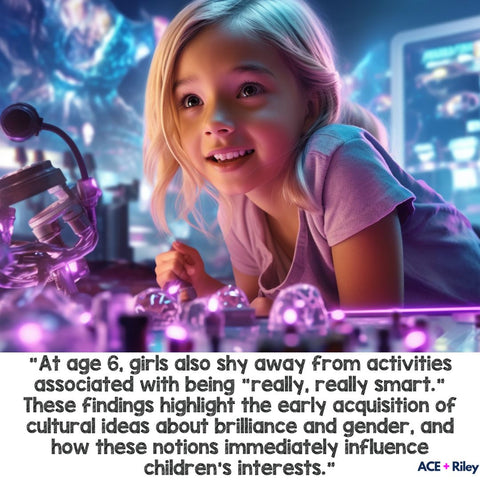The Impact of Stereotypes on Children's Career Aspirations

A summary from an article published in the Journal "Science" by Bian et al. (2017)
Societal stereotypes have a profound influence on shaping the career aspirations of young men and women. These stereotypes, such as the belief that men are better at mathematics, not only affect women's performance in STEM fields but also undermine their interest in pursuing math-intensive careers. Furthermore, the pervasive stereotype that brilliance is more commonly found in men than in women has been linked to gender gaps in prestigious occupations. Little is known, however, about when and how children acquire these stereotypes and how they impact their aspirations. In this blog post, we delve into a research article that sheds light on the early acquisition of the "brilliance = males" stereotype and its implications for children's interests and future career paths.
Understanding the Stereotype
The research conducted with 400 children reveals that by the age of 6, girls are less likely than boys to associate their gender with being "really, really smart," a child-friendly way of referring to brilliance. At the same age, girls also shy away from activities associated with being "really, really smart." These findings highlight the early acquisition of cultural ideas about brilliance and gender, and how these notions immediately influence children's interests.

The Toll on Women's Careers
The "brilliance = males" stereotype takes a toll on women's career choices, especially in fields that highly value sheer brilliance, such as mathematics, physics, and philosophy. These fields exhibit lower proportions of women earning bachelor's and doctoral degrees. While previous investigations have focused on college-age participants, it is crucial to recognize that cultural messages about cognitive abilities start influencing children early on, potentially causing capable girls to veer away from certain fields before reaching college.
Study Findings
The study examined the developmental trajectory of the "brilliance = males" stereotype in 96 children aged 5, 6, and 7. The results indicated a significant change in children's ideas about brilliance during this period. At age 5, both boys and girls associated brilliance with their own gender to a similar extent. However, by ages 6 and 7, girls were significantly less likely than boys to link brilliance to their own gender. This suggests that the stereotype begins to influence children as young as 6, impacting their self-perception and aspirations.
Breaking Barriers
Understanding the early acquisition of stereotypes and their impact is crucial in dismantling gender biases in career choices. By challenging these stereotypes and providing equal opportunities and encouragement for girls in all fields, we can empower them to pursue their passions and reach their full potential. Together, we can create a future where brilliance knows no gender boundaries, and every child can aspire to greatness.
Take Away Points
The research highlights the importance of addressing stereotypes and biases from an early age. By fostering an environment that promotes equality and challenges gender-related stereotypes, we can inspire young girls to dream big and pursue careers in any field they desire. Let's work together to break down barriers, empower our children, and create a future where brilliance is recognized irrespective of gender.
Research Article:
Gender stereotypes about intellectual ability emerge early and influence children’s interests (find it here)
